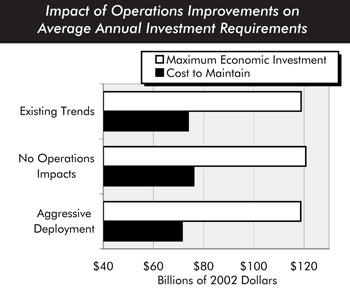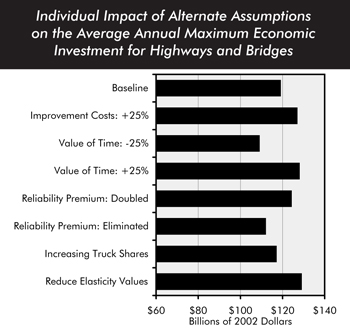
Sensitivity Analysis: Highway and Bridge
The usefulness of any investment requirements analysis depends on the validity of the underlying assumptions used to develop the analysis. Since there may be a range of appropriate values for several of the model parameters used in these analyses, this report includes an analysis of the sensitivity of the estimated Maximum Economic Investment (Cost to Improve Highways and Bridges) and Cost to Maintain Highways and Bridges to changes in these assumptions. [See also "Congestion Pricing" on page ES-13.]
Operations Improvements
The baseline estimates of future investment requirements reflect the impacts of existing trends in the deployment of operations strategies and intelligent transportation systems technologies on highway performance. Had such impacts not been considered, the Cost to Maintain conditions and performance on highways would have been 3.0 percent higher. If the deployment of operations improvements were to accelerate significantly in future years, the projected Cost to Maintain Highways and Bridges might decrease by 3.3 percent.

Value of Time
The value of time in the Highway Economic Requirements System (HERS) was developed using a standard methodology adopted by the Department, but other values are used inside and outside the Federal government. Increasing the value of time by 25 percent would increase the Maximum Economic Investment level by 7.6 percent. Cutting it by the same margin would reduce the Maximum Economic Investment level by 8.4 percent.
Construction Costs
If currently unforeseen circumstances were to cause future highway construction costs to unexpectedly rise by 25 percent in constant dollar terms, this would increase the Maximum Economic Investment level by 6.6 percent. The increased cost of individual projects would be partially offset in this scenario by some projects that would no longer be cost-beneficial.

Note:
The impacts of alternative model parameters and procedures shown above for the Maximum Economic Investment scenario are more ambiguous for the Cost to Maintain, as many of these parameters are used in the calculation of baseline user costs. By changing these parameters, the target user cost level being maintained under the scenario is also changed, so in essence, the definition of what is being "maintained" would be different.

